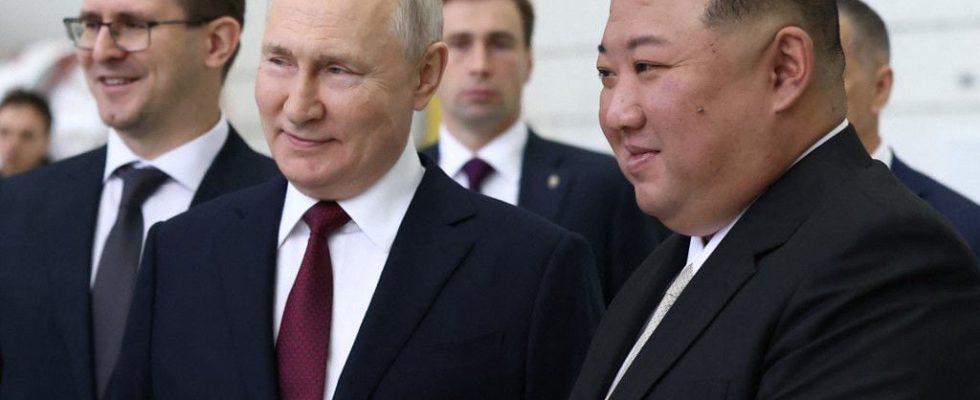In three months, tens of thousands of Russians have admired this photograph of a country in which everything is well. Vladimir Putin inaugurated last December in Moscow a gigantic exhibition studded with clichés on “eternal Russia”, where dozens of idealized regions form a Potemkin nation. This staging plays a key role in the strategy of the Russian president, who is organizing his re-election for a fifth term from March 15 to 17 against three minor candidates co-opted by those in power. Corporations from all over the country are brought there daily: gymnasts, firefighters, soldiers, public service agents, etc.
We almost forget the horrors of the war in Ukraine. An entire pavilion is dedicated to the Ministry of Defense, but it seems mainly aimed at children. We discover the conflict in a fun way, through video games, a parachute jump simulator or even a field hospital populated with mannequins on which children can practice war medicine.
More than ever, Vladimir Putin seeks to stir up patriotic sentiment and militarize the population from a very young age. Combining nationalism and conservatism, he particularly wants to encourage women to give birth to future defenders of the homeland. And hunts down anyone who opposes his “special military operation”. The day after the invasion of Ukraine, in February 2022, he called for attacking “bad citizens”: “the Russian people are capable of distinguishing true patriots from scum and traitors, and of spitting out these like a gnat that accidentally landed in their mouth,” he then threatens. This is one of the functions of the presidential election: to “campaign” on the idea of a people united behind the president and his war. With the aim of an announced plebiscite, coupled with a significant participation rate, which will allow the winner, in power for almost twenty-five years, to triumphantly fill the Luzhniki stadium in Moscow from March 18. A new development is that not only must Russians not protest, but they are now called upon to express active support, at the risk of being excluded from society or even persecuted.
A few hundred meters from the Patriotic Salon in Moscow, it is this real, authoritarian Russia that shines. In the small court in the Ostankino district, headquarters of state television, a handful of young anti-Putin activists gather in front of a courtroom. Anna Badditionova, 30, is to be tried there in connection with a “criminal” case. She was the victim of an informer who took the Russian president’s appeal literally. Last summer, the young woman made a live video broadcast on the “Twitch” platform in which she showed images of Boutcha, the scene of atrocities committed by Russian soldiers in Ukraine. To her spectators, she then explains that the Russian army is responsible for 300 civilian deaths and reads testimonies from torture victims. Comments made illegal in Russia, where Boutcha is the subject of collective negation facilitated by propaganda which has multiplied counter-fires on the subject. If Anna Badditionova “gets away with five years, the minimum sentence, she will be lucky: these are our only victories these days”, confides a young woman involved in helping political prisoners. Alongside him, a journalist from the independent media Sota, still tolerated in Russia, spent around twenty days behind bars in January for shouting “shame!” following a hearing.
On December 8, it was during a well-oiled sequence, alongside a soldier from Donbass, that Vladimir Putin announced his candidacy for the presidential election. A way of telling the Russians that now is not the time for de-escalation and that it is the soldiers who have their trust, and no longer the civilians. Faced with the emergence of a movement of women demanding the return of their husbands mobilized on the Ukrainian front, the Kremlin appears sure of itself, without empathy. During a visit by these women to the president’s campaign headquarters, a pro Putin activist gave them the official position: “men are warriors, unique creatures of God who want to defend their homeland,” she said. launched, before attempting a parallel with the heroic soldiers of the Second World War.
Because throughout the country, today’s Russia is now openly compared to the Stalinist period. Some are delighted, like Igor, 15 years old, met during a tribute to Stalin. He is obsessed with the idea of a “fifth column”. “There is no proof that Stalin was a tyrant and that he killed people,” he assures. “I respect him, he is immortal, we owe him a lot, contrary to what the enemies of the people say. ” He supports the Russian president, “an intelligent man, who is trying to exhaust the ammunition of NATO and the Nazis in Ukraine, like Stalin in his time against the German Nazis.” Another Russia sees it as a step backwards. It was she who came to light during Alexeï Navalny’s funeral, marching in tens of thousands towards his coffin on March 1st. But fear is omnipresent. Georgii, a Russian-Georgian entrepreneur, did not dare to pay homage to the martyr who died in a penal colony, who in his eyes represented the last influential figure of the Russian opposition. “There are no more laws, we can send you to prison for words, stop your car and hide drugs there… Denunciation is everywhere. The future will only bring us war, abroad or with us,” he sighs.
At the end of February, North Korea, which also supplies arms to Moscow, praised in the Russian press the opening of a brand new ski resort on its soil for Russian tourists. Many Internet users criticize this rapprochement between the two autocracies, believing that Russia increasingly resembles the Pyongyang regime. A drift that becomes more real every day.
.
